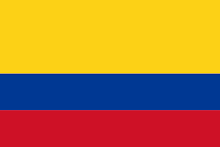Colombia (pronounced /kəˈlʌmbiə/), officially the Republic of Colombia (Spanish: República de Colombia, pronounced [reˈpuβlika ðe koˈlombja] , is a constitutional republic in northwestern South America. Colombia is bordered to the east by Venezuela and Brazil; to the south by Ecuador and Peru; to the north by the Caribbean Sea; to the northwest by Panama; and to the west by the Pacific Ocean. Colombia also shares maritime borders with Jamaica, Haiti, the Dominican Republic, Honduras, Nicaragua and Costa Rica. Colombia is the 26th largest nation in the world and the fourth largest in South America. It has the 29th largest population in the world and the second largest in South America, after Brazil. Colombia has the third largest Spanish-speaking population in the world after Mexico and the United States.
The territory of what is now Colombia was originally inhabited by indigenous nations including the Muisca, Quimbaya, and Tairona. The Spanish arrived in 1499 and initiated a period of conquest and colonisation which ultimately led to the creation of the Viceroyalty of New Granada (comprising modern-day Colombia, Venezuela, Ecuador and Panama) with its capital at Bogotá. Independence from Spain was won in 1819, but by 1830 "Gran Colombia" had collapsed with the secession of Venezuela and Ecuador. What is now Colombia and Panama emerged as the Republic of New Granada. The new nation experimented with federalism as the Granadine Confederation (1858), and then the United States of Colombia (1863), before the Republic of Colombia was finally declared in 1886. Panama seceded in 1903.
Colombia is a standing middle power with the fourth largest economy in South America and a major impact of poverty. It is very ethnically diverse, and the interaction between descendants of the original native inhabitants, Spanish colonists, African slaves and twentieth-century immigrants from Europe and the Middle East has produced a rich cultural heritage. This has also been influenced by Colombia's varied geography. The majority of the urban centres are located in the highlands of the Andes mountains, but Colombian territory also encompasses Amazon rainforest, tropical grassland and both Caribbean and Pacific coastlines. Ecologically, Colombia is one of the world's 18 megadiverse countries (the most biodiverse per unit area).
The territory of what is now Colombia was originally inhabited by indigenous nations including the Muisca, Quimbaya, and Tairona. The Spanish arrived in 1499 and initiated a period of conquest and colonisation which ultimately led to the creation of the Viceroyalty of New Granada (comprising modern-day Colombia, Venezuela, Ecuador and Panama) with its capital at Bogotá. Independence from Spain was won in 1819, but by 1830 "Gran Colombia" had collapsed with the secession of Venezuela and Ecuador. What is now Colombia and Panama emerged as the Republic of New Granada. The new nation experimented with federalism as the Granadine Confederation (1858), and then the United States of Colombia (1863), before the Republic of Colombia was finally declared in 1886. Panama seceded in 1903.
Colombia is a standing middle power with the fourth largest economy in South America and a major impact of poverty. It is very ethnically diverse, and the interaction between descendants of the original native inhabitants, Spanish colonists, African slaves and twentieth-century immigrants from Europe and the Middle East has produced a rich cultural heritage. This has also been influenced by Colombia's varied geography. The majority of the urban centres are located in the highlands of the Andes mountains, but Colombian territory also encompasses Amazon rainforest, tropical grassland and both Caribbean and Pacific coastlines. Ecologically, Colombia is one of the world's 18 megadiverse countries (the most biodiverse per unit area).

